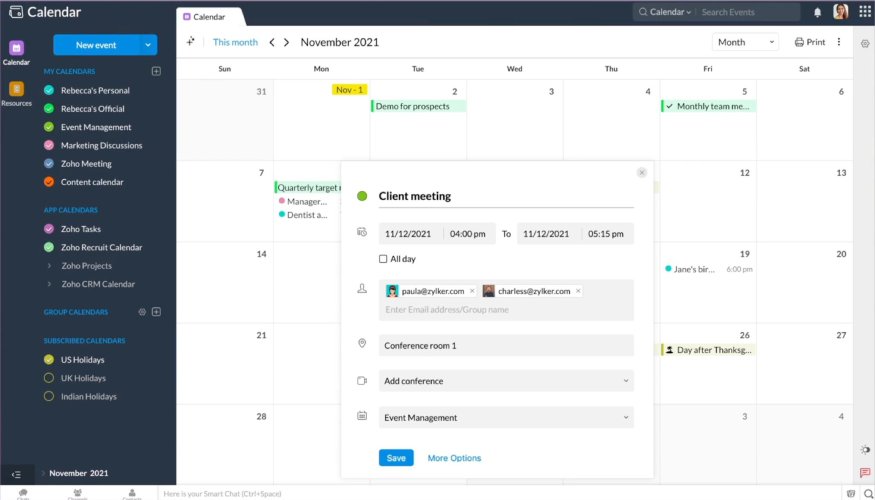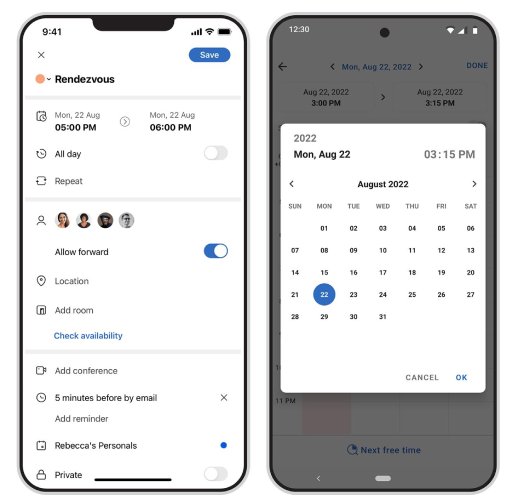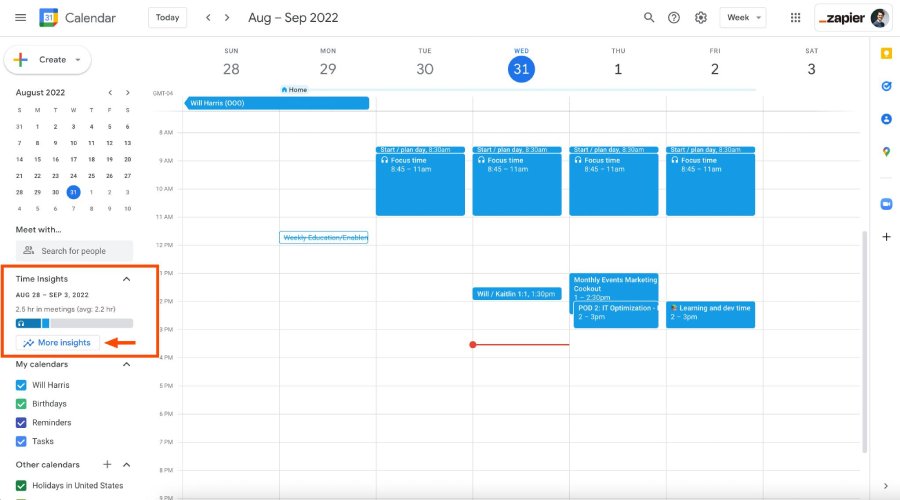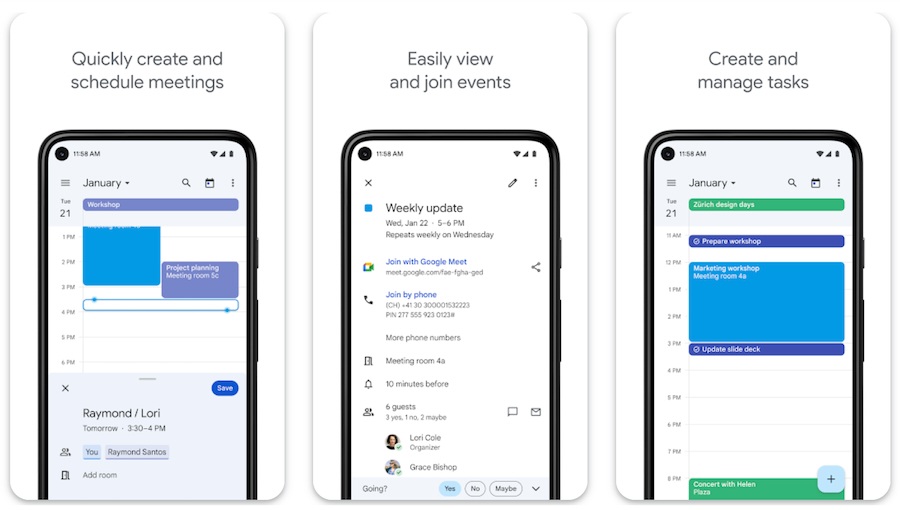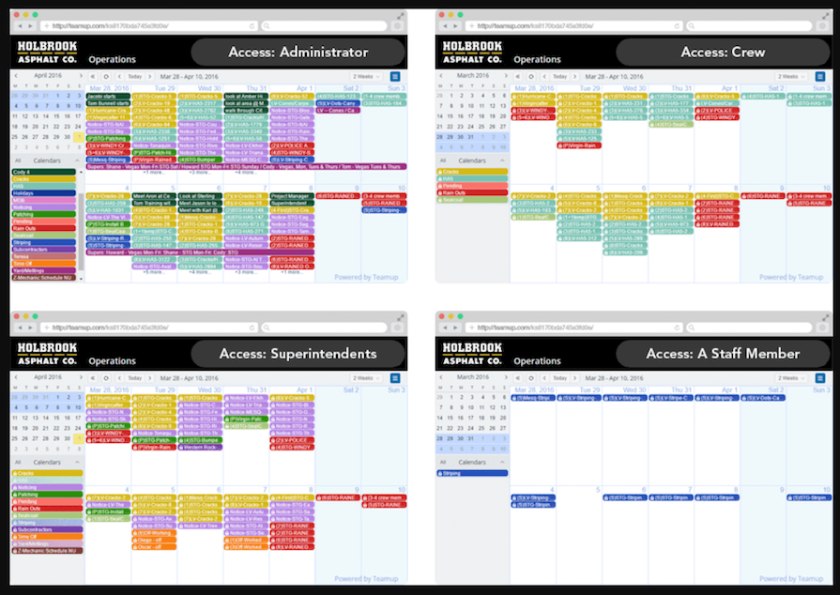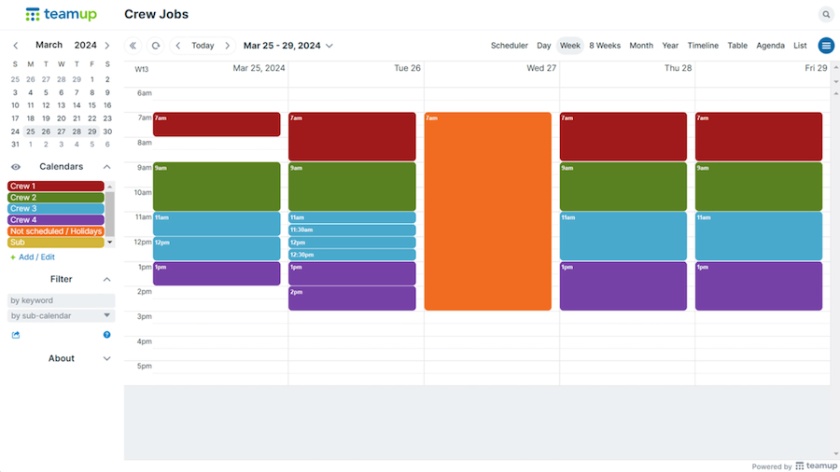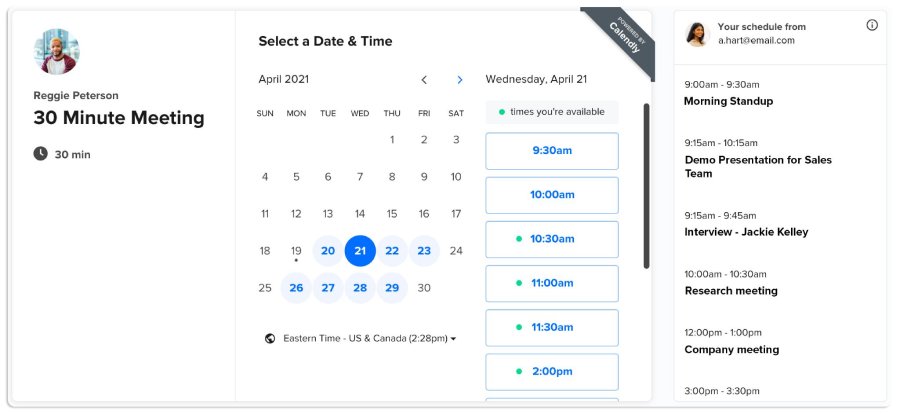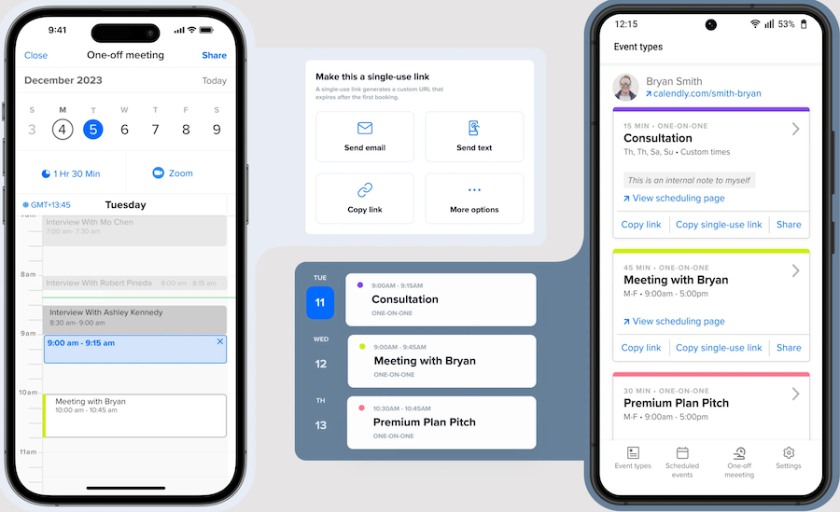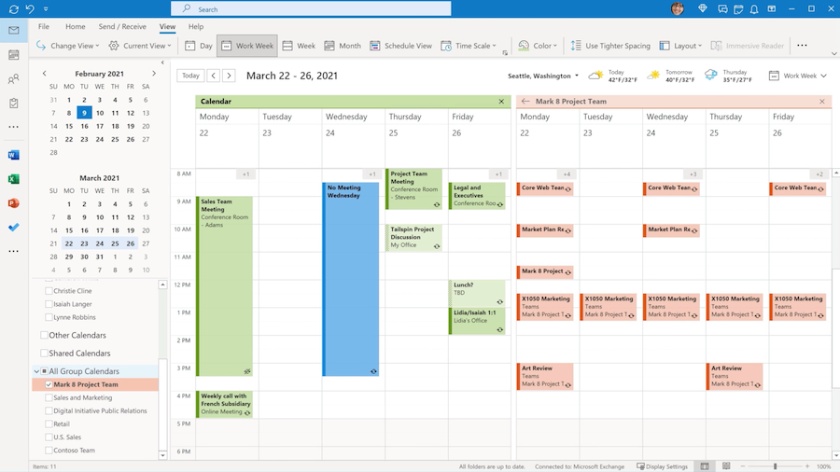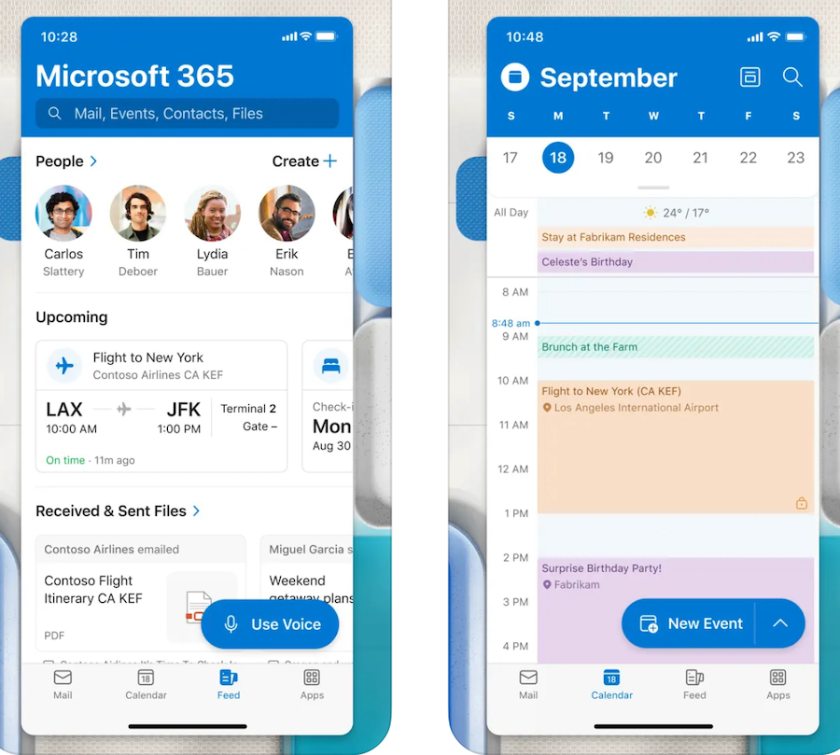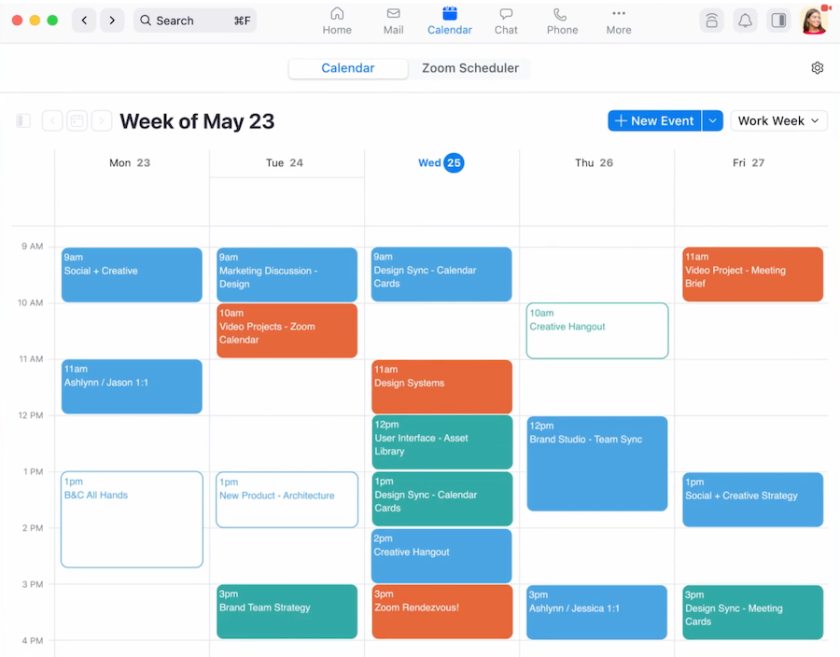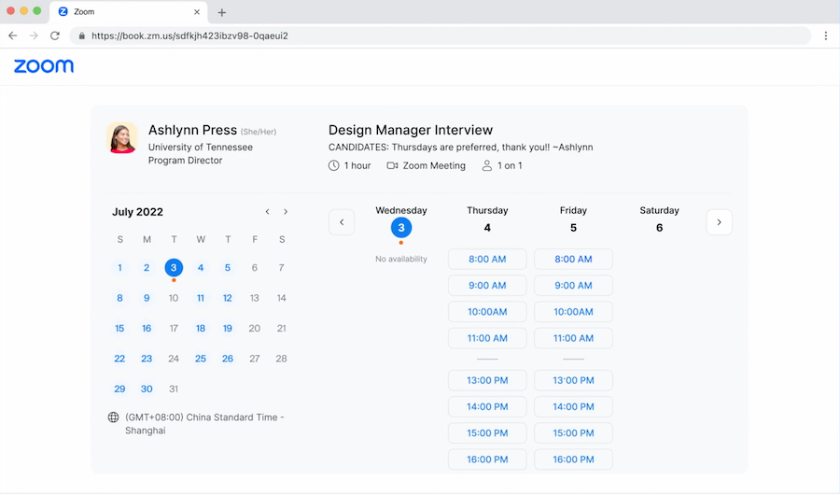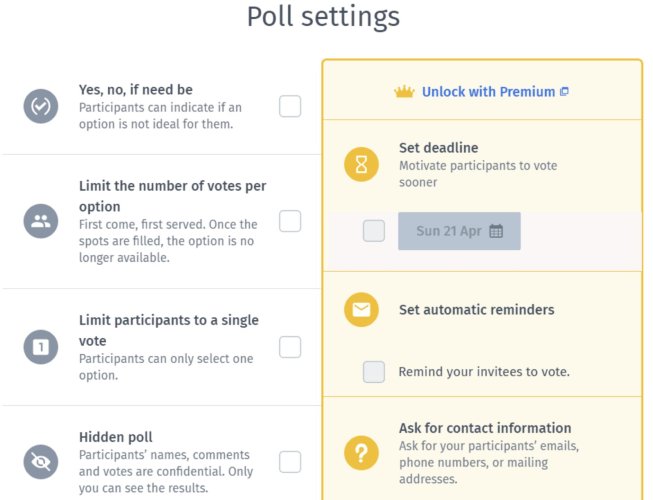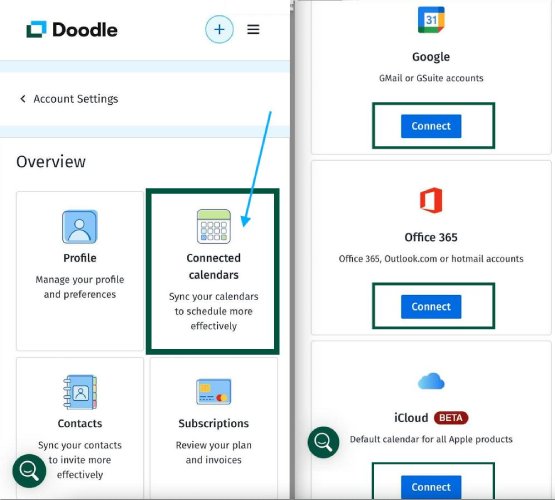A shared online calendar makes it easy to set up meetings and client appointments, track sales activities, and oversee task management. The best shared calendar app for small businesses lets you schedule events and offers functionality for collaboration, third-party integrations, and built-in appointment reminders. We’ve rounded up the top seven options based on pricing, ease of use, and essential features.
- Zoho Calendar: Best overall shared calendar app with sales integrations
- Google Calendar: Best for team collaboration
- Teamup: Best for customizing user access
- Calendly: Best for multiple cross-platform syncing
- Microsoft Outlook: Best for data security
- Zoom Scheduler: Best for scheduling Zoom meetings
- Doodle: Best for simplified group meetings
Best Shared Calendar App for Small Businesses Compared
Provider | Free Plan | Our Rating out of 5 | |
|---|---|---|---|
✓ 1 user | $0 for 1 user | 4.69 | |
✕ 14-day free trial | $5.40 per user | 4.60 | |
 | ✓ 8 users | $10 for 12 users | 4.58 |
✓ 1 user | $10 per user | 4.55 | |
✕ | $6 per user | 4.35 | |
 | ✕ | $4.99 per user | 4.23 |
✓ 1 user | $6.95 per user | 4.10 | |
Zoho Calendar: Best Free Shared Calendar App for Businesses That Need a Sales Integration

Pros
- It can integrate with other Zoho workplace and business apps.
- It has customizable notifications and availability confirmation.
- It comes with standard user and privacy management.
Cons
- Mobile app is not as intuitive as the web version.
- It has limited appointment booking capabilities and no booking page.
- It has synchronization issues with external calendars.
- You want access to other free sales apps: Once you sign up for Zoho Calendar, you can also have access to other free apps in the Zoho ecosystem. For example, you can explore Zoho CRM features, create Zoho Mail for five users, embed Zoho meetings for webinars, and use other tools for your business operation—all without spending a dime.
- You need additional customization for meeting reminders: When sending a meeting invite through Zoho calendar, you can choose a reminder type between an email, popup, or notification. Recipients also have a dedicated button in the calendar called “Yet to Respond” for event invites waiting for attendance confirmation. That way, users can review calendar invites without scrolling through their emails.
- You want an intuitive calendar app for mobile devices: Zoho Calendar has a seamless web-based calendar with clear-cut functionality. However, users observe lagging and syncing problems, especially with mobile devices. If you’re reliant on your smartphone, you may want to consider a dedicated shared calendar mobile app.
- Alternatives: Doodle and Zoom Scheduler are excellent choices if you want a basic shareable calendar you can sync with your mobile devices.
- You need a more comprehensive all-in-one scheduling option: As a schedule tracking and sending tool, the Zoho calendar may be enough for small businesses and sales teams. But if you need to expand to external online appointment booking features, you won’t find it here, primarily because Zoho has Zoho Bookings for that functionality. It’s another free platform that requires a learning curve of its own.
- Alternative: Calendly is our best calendar-sharing app for business with broad scheduling features for teams and clients alike. Google Calendar, through Google Workspace, also offers all-in-one scheduling tools for both online and offline events.
Zoho Calendar Pricing Plan*
Free
Cost:
- $0 for one user
Key Features:
- Up to 50 shared calendars
- Appointment scheduler
- Availability confirmation with attendees
- Customizable notifications for RSVP updates and reminders
- Templates for calendar personalization
- Website integration for team calendars
- Privacy controls
- Cross-calendar sharing with external platforms
- Integrations with third-party and native Zoho apps
- Moderator assignments and team calendar monitoring for admins
*While we update pricing information regularly, we encourage our readers to verify prices independently.
While Zoho Calendar offers robust features for setting up meetings with teams, qualified leads, and clients, you can access more online booking and calendar syncing capabilities with Zoho Bookings. Get additional appointment features, sales and marketing support, and dedicated booking pages for free or at a starting cost of $6 per user monthly.
Our Expert Opinion
We consider Zoho Calendar the best shared calendar app for small businesses needing a free shareable calendar app, especially for those already using Zoho business tools. It offers a sleek, user-friendly interface that connects with Zoho’s other work applications. We like the varying options to notify recipients and meeting attendees and the extra attention to RSVP confirmation.
Google Calendar: Best Shared Calendar App for Team Collaboration
Pros
- It has an all-in-one collaboration solution with a shared calendar for online and offline events.
- It offers native videoconferencing via Google Meet.
- It provides user management and security controls.
Cons
- It has no free plan in Google Workspace.
- Users report difficulty in connecting external calendars like Outlook.
- Task scheduling customization is limited.
- You want a shareable calendar for collaboration: Google Calendar is one of the products you can use when you have a Google Workspace subscription. Aside from scheduling, you can access time insights and group calendars. You can set your status, share files and meeting notes, and check your team’s availability during certain dates and times.
- You conduct offline and online meetings: Setting online meetings on Google Calendar is a breeze since you can add Google Meet, its native videoconferencing tool, and even Zoom in the invitation. Plus, you can share a booking page with clients and other stakeholders. Google Calendar also has great offline meeting features, such as room booking and a map for locating venues.
- You need a free shared calendar with a business booking page: You can use Google Calendar for free when you sign up for a personal Gmail. However, this is not recommended for sales teams and small businesses if you want to maintain professional authority. That said, Google Calendar for business may not be the right app to start with if you want a free appointment scheduler for your team.
- Alternative: Calendly offers a booking page with your logo in its free plan, making it one of our best free shared calendar apps.
- You want color labels for tasks: Google Calendar has various color labels for meetings, allowing you to group them based on type or custom tags. We can’t say the same for tasks, though. When creating a task, you only need to input the title, details, date, and time. There’s no customization for priority level.
- Alternative: Consider Teamup if you want to schedule tasks and sort them using colors, folders, and sub-calendars.
Google Workspace Pricing Plans*
Google Workspace Pricing Add-on:
- Gemini (AI assistant): $20 to $30 per user monthly
*Pricing is based on annual billing on a per-month breakdown. Monthly billing and enterprise-level options are available for a higher cost. It comes with a 14-day free trial. While we update pricing information regularly, we encourage our readers to check current pricing.
Our Expert Opinion
Google Calendar combines simplicity and functionality through features that set meeting essentials. These include videoconferencing tools, a premade agenda template, a room scheduler, a map locator, and automated notifications on your mobile device or computer. It’s a testament to Google Workspace’s reputation in the productivity and collaboration arena, specifically in streamlining workflows for small businesses.
Teamup: Best Shared Calendar App for Businesses That Need Customized Access Permissions

Pros
- It offers robust customization capabilities for access permissions and calendar views.
- It offers niche-specific templates for field work schedules, construction jobs, fleet management, and studio booking.
- You can add images, links, and file attachments to events.
Cons
- Its interface is complicated because of robust customization options.
- It has limited direct integrations, with most requiring API or Zapier.
- Single sign-on and the option to remove Teamup branding is locked in with the Enterprise plan ($105 per month for 100 users).
- You want a shared calendar with deep customization capabilities: Across all plans, Teamup allows admins to customize user access for calendars and sub-calendars. You can select which sub-calendars can be shared securely with an individual, group, or public audience. Plus, you can organize sub-calendars by color, folder, and view type and add your company logo to your work calendar.
- You need a work calendar for managing field work and attendance: Teamup offers several templates for overseeing team schedules, availability, and paid time off. These include a general team calendar, an annual planning calendar, construction crew scheduling, fleet vehicle scheduling, and studio booking calendar templates. You can leverage these templates to streamline project and task assignments.
- You’re looking for a more straightforward shared calendar app for business: Teamup’s deep customization options make its interface more complicated than most platforms. This creates a bit of a learning curve for first-time users, especially those who want to start customizing their group calendars.
- Alternatives: Doodle and Zoom Scheduler have simple and clean interfaces that allow users to easily schedule group meetings and events with little to no learning curve.
- You need a shared calendar app for business with wider integration options: Teamup offers limited direct integration options, which include Google Calendar, Outlook, iCal, Microsoft Teams, Slack, Trello, and CompanyCam. You’ll need to use an app connector like Zapier for broader integrations.
- Alternatives: Zoho Calendar and Calendly are two platforms that can seamlessly integrate your shareable calendar with apps like Zoom, Slack, Intercom, HubSpot CRM, Mailchimp, and Salesforce.
Teamup Pricing Plans*
*Pricing is based on annual billing on a per-month breakdown of the plans. Monthly billing and enterprise-level options are available for a higher cost. Paid plans come with a three-day free trial. While we update pricing information regularly, we encourage our readers to check current pricing.
Our Expert Opinion
Teamup offers highly customizable group calendars and sub-calendars, which can be configured for specific user levels, giving each group a less cluttered view of their schedule. In addition, you can leverage its calendar templates to streamline project and task scheduling. You can add images, links, and files to events to give teams more comprehensive job information. There are templates for crew jobs, fleet vehicle scheduling, team activities, and studio booking.
Calendly: Best for Cross-Platform Synchronization

Pros
- It intuitively integrates with other calendars, customer relationship management (CRM) systems, and productivity tools
- You can add a calendar to your website for booking and time slot visibility.
- It has a straightforward interface and no learning curve.
Cons
- Free plan only lets you share one calendar.
- Access to usage metrics requires the Standard plan ($10 per user monthly).
- Routing feature is limited to Salesforce integration.
- You need a shared calendar app for business that syncs with multiple apps: Calendly is renowned for its seamless integration with many productivity tools, such as Zoom, Google Meet, Slack, and Intercom. Easily connect Calendly to external calendars, like Google and Outlook, without the dreaded back-and-forths through its automation capabilities and prevent double-booking separate events.
- You want a calendar-sharing app for a CRM: Calendly allows you to schedule and sync sales activities with the best CRMs for small businesses. You can use Calendly to set meetings with qualified leads through booking pages, customizable event invitations, and confirmation emails, streamlining your conversion tactics.
- You want to connect to multiple calendars for free: You can only connect to a single calendar through the free plan, which can be less than ideal if you want to sync two or more external calendars and view them on a single platform.
- Alternatives: Zoho Calendar and Teamup allow you to integrate your Google Calendar and Apple iCloud Calendar (iCal) at no cost.
- You need a cost-effective shared calendar app with analytics reporting: Keeping track of your team’s sales meetings and regular schedules can provide insights for better sales management. While Calendly offers usage metrics in its Standard plan for $10 per user monthly, there are still other relatively lower-cost alternatives.
- Alternative: Google Calendar has Time Insights that lets you see how much time is spent in meetings and who the user meets the most. You can access this feature even at the lowest-tiered plan for $5.40 per user monthly. Zoom Scheduler also offers meeting analytics for as low as $4.99 per user monthly.
Calendly Pricing Plans*
*Pricing is based on annual billing on a per-month breakdown of the plans. Monthly billing and enterprise-level options are available for a higher cost. Calendly offers a 14-day free trial for the Teams plan. While we update pricing information regularly, we encourage our readers to check current pricing.
Our Expert Opinion
Calendly is a scheduling champion with its seamless alignment with many of the best sales management tools, including external calendars. Users can fully control their schedules from one interface that syncs with other platforms. While the free plan offers the essential scheduling features, scaling up becomes well worth it as your business grows, considering Calendly’s syncing ability with other sales functionalities like lead qualification.
Microsoft Outlook: Best for Teams Prioritizing Data Security

Pros
- It provides security controls for calendar data visibility and safety features against unauthorized access.
- It has a notification for double bookings and conflicted events.
- It offers meeting insights with suggestions for files to include, emails, and other valuable information for the upcoming meeting.
Cons
- Using the calendar app requires a paid subscription to Microsoft 365; there is no free plan available.
- Its numerous features can be overwhelming.
- It has limited direct cross-platform integration.
- You want a shared business calendar with advanced security features: Microsoft 365 Business houses Outlook calendar and has a reputation for valuing data privacy and identity protection, making it fit for businesses that handle confidential information. It also employs multifactor authentication, data loss prevention, data encryption, and identity management to ensure the safety of people involved in specific meetings.
- You’re eyeing a shareable calendar that provides data-based suggestions: One impressive feature of this calendar is its Meeting Insights, which suggests information to include, like announcements, files, and other people. It’s highly personalized based on available files and your email exchanges. There’s also the Scheduling Assistant that checks availability for people you plan to meet with.
- You want a simple business calendar sharing app: Since Outlook calendar is not a standalone app, its connection to various MS365 tools and feature-packed interface may require a steep learning curve. In this case, it’s not ideal for users looking for a straightforward shareable calendar limited to scheduling and task management.
- Alternatives: Consider Doodle if you want a shareable calendar app with no frills, especially if you’re still getting comfortable with cloud-based calendars. Zoom Scheduler is our top pick for teams using the Zoom Workplace platform.
- You need a free shared calendar app for collaboration management: Given Microsoft 365’s design for scaling businesses and its robust set of collaboration and management tools, a free plan is out of the question. To leverage Outlook Calendar, you must shell out at least $6 per user monthly.
- Alternative: Teamup is a solid pick if you’re looking for a schedule-sharing app that goes side-by-side with basic task management features. You can leverage its sub-calendars and direct Trello integration for easier task assignments.
Microsoft 365 Business Pricing Plans*
To use Microsoft Outlook email and shared calendar, subscribe to any of Microsoft 365’s plans. All plans provide access to a slew of productivity and collaboration tools valuable to small businesses.
Microsoft 365 Pricing Add-on:
- Copilot (AI assistant): $30 per user monthly
*Pricing is based on annual billing on a per-month breakdown. Monthly billing is available for a higher cost. Microsoft 365 offers a 30-day free trial for the paid plans. While we update pricing information regularly, we encourage our readers to check current pricing.
Our Expert Opinion
Although calendar visibility is crucial for prospecting and lead management, data privacy still takes precedence—a principle Microsoft Outlook clearly values. We like the extra security features that expand as you move to higher-tiered plans. The new automated prompts and tailored recommendations for meeting schedules also come in handy when preparing for a sales demo or business presentation.
Zoom Scheduler: Best for Scheduling Zoom Meetings

Pros
- It has native integration with Zoom Meetings for videoconferences and Zoom Phone for AI-powered voice communications.
- Core features include meeting polls, analytics, automations, and unlimited booking links.
- It offers booking page branding options with company logo and color palette.
Cons
- Integrations are limited to Zoom apps, calendar apps, and Salesforce.
- It has no standalone mobile app; Zoom Scheduler is built into the main Zoom app.
- It doesn’t offer a free plan and requires paid subscription starting at $4.99 per user monthly.
- Your hybrid team uses Zoom apps for communication: Zoom Scheduler is part of the Zoom Workplace suite of apps. It seamlessly integrates with Zoom Meetings, Team Chat, Phone, Mail Client, Calendar Client, and Workvivo. Given that Zoom has over 300 million daily active users, you can use the Scheduler to set appointments with a broad set of audiences.
- You want access to built-in meeting polls and analytics: Zoom Scheduler allows users to create a poll so that participants can vote on their preferred meeting time. The platform also provides users with analytics and insights into appointment bookings and trends in app usage.
- You need a shareable calendar for the best sales apps: Unfortunately, Zoom Scheduler’s integrations are very limited. It offers native integration with other Zoom apps like Zoom Meetings and Zoom Phone, but its third-party app integrations only include calendar apps and Salesforce.
- Alternatives: Zoho Calendar and Calendly both offer integrations with a wide range of apps. These include CRMs like HubSpot CRM and Salesforce, as well as communication apps like Slack and Intercom.
- You’re looking for a standalone mobile shared calendar app: Zoom Scheduler does not offer a standalone mobile app. It is built into the main Zoom Workplace platform. This includes Zoom’s apps for videoconferencing, phone, team chat, digital whiteboard, and workspace reservation.
- Alternative: If you want a standalone shareable calendar for mobile use, consider Google Calendar and Doodle.
Zoom Scheduler Pricing Plans*
*Pricing is based on annual billing on a per-month breakdown of the plan. Monthly billing is available for a higher cost. Zoom Scheduler offers a 14-day free trial. While we update pricing information regularly, we encourage our readers to check current pricing.
Our Expert Opinion
Zoom Scheduler is a highly intuitive and user-friendly shared calendar made for teams using the Zoom Workplace platform for collaboration. You can join a Zoom video or voice conference directly from the Scheduler app, and it has built-in meeting polls, analytics, and automation. Plus, you can customize your booking page with your company logo and brand colors. Finally, it integrates with Salesforce and popular calendar apps like Google and iCal.
Doodle: Best Shareable Calendar App for Simplified Group Meetings

Pros
- It offers consensus scheduling using meeting polls.
- It is user-friendly with a simple interface.
- It offers availability sharing through a link.
Cons
- Free plan allows only one booking page and one one-on-one meeting per month.
- Ad removal requires the paid plans (starting at $6.95 per user monthly).
- It has limited functionality, customizations, and integrations.
- You need a shared calendar for large groups: Doodle is a crowd favorite for setting group meetings with its ability to synchronize and confirm available schedules for all attendees. Using the meeting poll, organizers can identify ideal dates and times that guarantee maximum attendance.
- You want an easy-to-use app with straightforward features: The Doodle interface is clean and professional, with clear-cut scheduling functionality. Teams needing a platform to secure time slots for events and meetings can find good value with Doodle.
- You’re looking for a calendar app with extended features: Doodle’s simplicity can be both a blessing and a curse, depending on your business needs. Those wanting capabilities beyond scheduling may find the shareable calendar inadequate.
- Alternatives: Outlook Calendar, through Microsoft 365, has a myriad of productivity tools. Another excellent pick is Google Calendar from Google Workspace.
- You want a free shareable calendar without any ads: Both Doodle’s web version and mobile app contain ads on its free plan, and you can only opt for removal when you sign up for at least the Pro plan.
- Alternative: Zoho Calendar is another free, user-friendly app that stands out from Doodle for its zero ads.
Doodle Pricing Plans*
*Pricing is based on annual billing on a per-month breakdown of the plans. Monthly billing and enterprise-level options are available for a higher cost. While we update pricing information regularly, we encourage our readers to check current pricing.
Our Expert Opinion
Doodle’s poll setting ensures the best time for large teams to meet. It’s also valuable for big events such as an online webinar or a business expo. The features are uncomplicated, and you can access third-party apps via integration and added security layers in the lowest-tiered plan for $6.95 per user monthly.
How We Evaluated the Best Shared Calendar App for Small Businesses
Small businesses using a shared calendar app find it easier to maximize their time, organize their daily workload, and keep everyone in the loop for important events. With these in mind, we evaluated the business calendar providers based on essential features like schedule management, collaboration tools, automated reminders, and cross-platform sync.
We also examined each provider’s pricing structure, customer support, and overall usability. Review our evaluation insights on the best shared calendar apps.
25% of Overall Score
The top considerations for our picks for the best calendar-sharing apps include relevant scheduling capabilities like tools for organizing meetings, sending invitations, and connecting with collaboration tools. We evaluated the native and third-party apps and how seamless the integration process is. The availability of a mobile version is also a crucial part of this criterion.
20% of Overall Score
While most shareable calendar-sharing apps are relatively more affordable than other business tools, their value for money might vary based on functionality. We checked for any free plans and their key features. Then, we evaluated their pricing plans and matched the upgrades with the perceived expanded value.
20% of Overall Score
Advanced features consist of capabilities that enhance user experience and business solutions. For this criterion, we evaluated how well calendar sharing and cross-platform sync go for each provider. We also looked into multiple notification options and availability management.
15% of Overall Score
Based on our personal experience of using CRM platforms for small businesses and testimonials from third-party review sites, we assessed the intuitiveness of each provider’s interface. We considered the simplicity of the navigation setup, feature organization, built-in automation, and onboarding implementation.
10% of Overall Score
Customer support comes in the form of help desk service and the availability of a learning hub. We checked each provider’s channel for customer service, be it email, phone, live chat, or a combination of the three. We also considered the available hours and the extensiveness of their knowledge base.
10% of Overall Score
Aside from firsthand experience, we looked into what actual users say about each app from reliable online reviews. We cross-checked the information we got from our own experience to develop a valid and reasonable assessment. Close attention was paid to product usability and user-friendliness.
Frequently Asked Questions (FAQs)
Yes, you can find scheduling platforms that allow you to view multiple calendars in one interface, such as Calendly and Asana. You can also start using these apps for free.
Bottom Line
Small businesses and sales teams should have a shared calendar for schedule alignment when implementing sales and marketing strategies and managing all types of meetings. Easy access, automated notifications, and built-in event detail fields centralize relevant information for everyone. While Zoho Calendar is our top pick for the best shared calendar app for small businesses, other options may better suit your business needs.
